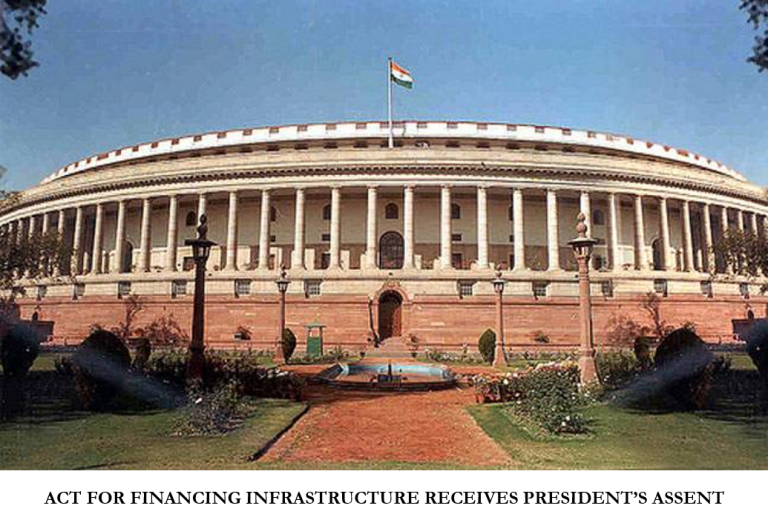ACT FOR FINANCING INFRASTRUCTURE RECEIVES PRESIDENT’S ASSENT
On 28-03-2021, the National Bank For Financing Infrastructure and Development Act (the Act), 2021 received #Presidentialassent. The Act which seeks to establish the National Bank for Financing Infrastructure and Development (#NBFID) as the principal Development Financial Institution (DFI) to fund infrastructure projects in India was introduced in the Lok Sabha on 22-03-2021 and passed by the Rajya Sabha on 25-03-2021.
The salient features of the Act are as follows:
- Establishment of NBFID
The National Bank for Financing Infrastructure and Development will be established as a Development Financial Institution (DFI) for financing infrastructure projects. It will be set up as a corporate body with authorised share capital of one Lakh Crore Rupees.
Shares of NBFID may be held by:
- Central Government
- Multilateral Institutions
- Sovereign Wealth Funds
- Pension Funds
- Insurers
- Financial Institutions
- Banks
- Any other Institution prescribed by the Central Government
Initially, the Central Government will own 100% shares of the Institution which may subsequently be reduced up to 26%.
- Purpose/Objectives of NBFID
NBFID will have both financial and developmental objectives.
- Financial Objectives will be to directly or indirectly lend, invest, or attract investments from private sector investors for infrastructure projects located entirely or partly in India. For the same, the Central Government will prescribe the sectors to be covered under the infrastructure domain.
- The prime developmental objective shall be to establish coordination with the Central and State Governments, Regulators, Financial Institutions, and other relevant stakeholders. Furthermore, facilitating the development of the market for bonds, loans, and derivatives for infrastructure financing.
- Functions of NBFID
Following are the functions of NBFID:
- To extend loans and advances for infrastructure projects,
- taking over or refinancing such existing loans,
- to attract investment from private sector investors and Institutional investors for infrastructure projects,
- to organise and facilitate foreign participation in infrastructure projects,
- to facilitate negotiations with various Government authorities for dispute resolution in the field of infrastructure financing, and
- to provide consultancy services in infrastructure financing.
- form and manage subsidiaries or joint ventures or branches, in India or outside India;
- co-ordinate its operations in the field of infrastructure finance and maintain expert staff to study problems relating to infrastructure finance and be available for consultation to the Central Government, the Reserve Bank and the other Institutions engaged in the field of infrastructure finance;
- set up trusts under the Indian Trusts Act, 1882 for establishment of funds for such nature as would assist in financing of infrastructure projects located in India;
- support the development of a deep and liquid market for bonds, loans and derivatives;
- set aside loans or advances held by the Institution and issue and sell securities based upon such loans or advances so set aside in the form of debt obligations, trust certificates of beneficial interest or other instruments, by whatever name called, and act as a trustee for the holders of such securities;
- assign securities issued to the Institution etc.
- Management of NBFID
NBFID will be governed by a Board of Directors. The Members of the Board shall include:
- the Chairperson appointed by the Central Government in consultation with RBI,
- a Managing Director,
- up to three Deputy Managing Directors,
- two Directors nominated by the Central Government,
- up to three Directors elected by shareholders, and
- a few independent Directors. The Board will appoint independent Directors based on the recommendation of an Internal Committee.
- Development Financial Institution
DFIs source funds from the market, Government and multi-lateral Institutions and are set up for the purpose of providing long-term finance. DFIs may be set up by applying to the Reserve Bank of India (RBI). In consultation with the Central Government, the RBI may grant a license for DFI.
- Support/Grants from the Government
The Central Government may support the Institution through grants worth Rs 5,000 Crore by the end of the first financial year. The Government shall also provide a guarantee at a concessional rate of up to 0.1%. This may be used for borrowing from multilateral institutions, sovereign wealth funds, and other foreign funds. Furthermore, costs towards insulation from fluctuations in foreign exchange (in connection with borrowing in foreign currency) may be reimbursed by the Central Government in part or full.
Full text of The National Bank for Financing Infrastructure and Development Bill, 2021 (as introduced in Lok Sabha) may be accessed at https://prsindia.org/files/bill_track/2021-03-22/The%20National%20Bank%20for%20Financing%20Infrastructure%20and%20Development%20Bill,%202021.pdf
Suchitra Upadhyay
Associate
The Indian Lawyer & Allied Services





































Leave a Reply